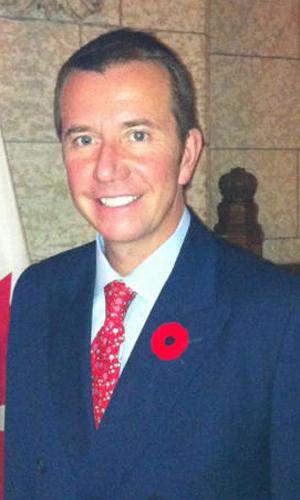There’s been a lot of talk in the news about contracts regarding Parliament Hill reconstruction contracts and potential political interference by the minister of public works. Talk in Question Period has also ranged from Christian Paradis’ appearances at political fundraisers with those who eventually got contracts, and has even extended to talk about Montreal mafia involvement.
Liberal Scott Brison was the public works minister from 2004 to 2006 in Paul Martin’s government, making him the first openly gay cabinet minister in Canadian history. Brison was also the youngest member of Martin’s cabinet.
Those were also the days of the Gomery Inquiry into the sponsorship scandal, where his department was heavily featured on a daily basis. So how did he deal with it all when he was minister?
“I kept myself hermetically sealed from procurement competitions,” Brison says. “I did and my staff did, and I would be involved in some of the design of a procurement strategy, but again, intentionally separated from the execution of a procurement strategy, as was my staff.”
Brison recalls that his was the hottest file politically at the time, as he had the responsibility for the government’s response to the Gomery Commission.
“Every day we had incendiary testimony – some of which was true, some of which was false, some of which was way out there and was pretty crazy stuff, and the political reality is that the public face of what I was doing that day was shaped around the 45 minutes of Question Period, of which I received over a thousand questions over this type of testimony,” Brison says.
“That was a constant challenge, but that was the public face of what I was doing. The more substantive part of what I was doing was driving procurement and real estate reform that has subsequently been good for the taxpayer, but much of which has been neglected and let atrophy by the government.”
Brison says that reform package saved $3 billion over a five-year period, and $1 billion every year after.
“It was twofold – we wanted to ensure the integrity of the contracting processes that were part of our work at the time, but we were also reforming the system to get the best value for taxpayers on a go-forward basis.”
With regards to the current situation with the Conservative government and the stream of revelations about Michael Fortier and Christian Paradis in the role, Brison sees some of the difficulties in the way their responsibilities were handed out.
“It puts a minister of public works in a very difficult position when he’s also a political minister,” Brison says. Political ministers are those who have regional responsibilities on top of those of their portfolio.
“I think the political ministers by nature are involved in a range of activities that make it more difficult for them to extricate themselves from political activity such as fundraising – it’s tougher,” Brison says. “I think that’s something prime ministers ought to consider when they’re naming a public works minister, is that the public works minister not necessarily be the political minister, that you separate the two roles because the pressures are going to be even more on a political minister.”
Watching recent events play out, Brison sees lessons that could be drawn.
“I don’t think either Minister Paradis nor his staff took adequate measures to keep him out of these types of situations,” Brison says. “It seems like they really were completely laissez-faire on this and did not recognize the importance of keeping the minister hermetically sealed from these potential conflicts.”
Brison looks back on his time as the minister with fondness.
“We had a good team in my ministerial office, and I had a very good relation with my deputy [minister] and the senior public service, and I think at that time, our department felt demoralized because of what was going on in terms of the sponsorship [scandal] and the rest of it,” Brison says. “I worked quite hard to engage meaningfully and respectfully our 14,000 team members, and I think we did a pretty good job of that.”


 Why you can trust Xtra
Why you can trust Xtra


